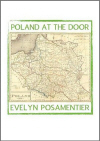Poland at the Door
Evelyn Posamentier’s Poland at the Door is a remarkable book. It is a collection of very short poems, the longest being ten lines while most of poems oscillate between four to six lines. The collection’s poetic “I” remains in a room, behind a closed door. She half-expects, half-dreads some visitors. Her short statements help to visualize her surroundings—walls, door, monitors in the hall outside, a broken phone, the weather in- and outdoors, and the luring but never really appearing guests. Longer poems are intertwined with single lines that laconically state “the days of awe” and “the days between” (or either of the two). This gives the impression of the passage of time in an unfamiliar place, reflecting perhaps Posamentier’s time spent in Poland. Occasionally, the “days of awe/days between” are replaced by the exclamation “holy, holy, holy,” which refers either to Poland’s Catholic culture or to the subject’s sense of the world’s sacredness.
Evelyn Posamentier’s Poland at the Door is a remarkable book. It is a collection of very short poems, the longest being ten lines while most of poems oscillate between four to six lines. The collection’s poetic “I” remains in a room, behind a closed door. She half-expects, half-dreads some visitors. Her short statements help to visualize her surroundings—walls, door, monitors in the hall outside, a broken phone, the weather in- and outdoors, and the luring but never really appearing guests. Longer poems are intertwined with single lines that laconically state “the days of awe” and “the days between” (or either of the two). This gives the impression of the passage of time in an unfamiliar place, reflecting perhaps Posamentier’s time spent in Poland. Occasionally, the “days of awe/days between” are replaced by the exclamation “holy, holy, holy,” which refers either to Poland’s Catholic culture or to the subject’s sense of the world’s sacredness.
Jumping from one short impressionistic poem to the next, the reader skips over the book’s most conspicuous characteristic, recurring throughout the collection—the phrase POLAND AT THE DOOR, printed in large letters on the top and in the midst of each page (the second one separating the upper poem from the lower one). While this makes the title figure, “Poland,” blatantly present, because of the repeating of the phrase, it becomes overlooked in the process of reading. With history reverberating throughout the book, such a device cleverly conveys something of Poland’s ghost-like presence in Europe throughout the nineteenth and a part of the twentieth centuries. Featuring an 1814 map of Poland, the book’s cover additionally supports such a reading. That year marked the end of Poland’s politically precarious existence—as the “Duchy of Warsaw”—on the map of nineteenth-century Europe, as well as the finale of the era of Napoleon. In a fascinating way, Posamentier captures some of her subject matter’s history, as in the following stanza:
POLAND AT THE DOOR
they came this way before.
i have seen them in all nights.
& in all days. they taste
of forever. who are they?
they pass, they move on
while my room remains silent
& awake, poland at the door.
Poland’s more recent history looms in this collection as well:
go out & smell
burning hair & so forth.
yellow it from the hours
……………………………
i don’t care about the clouds
grasping the sky. what else
can they do? they leave
their evil scent everywhere.
The evil scent of clouds may refer to air pollution or some industrial fumes. However, the immaterial and, paradoxically, ever-present guests/ghosts constantly animate the space surrounding the lyrical subject, hence suggesting the smell of the burning of human bodies and evoking the memory of the Second World War and the Holocaust.
Posamentier’s subject perceives the surrounding world through what she hears, as in the lines “the door mat shivers outside. / i hear it complaining of footsteps”; through what she feels, as in “i am cold.”; through what she sees, as in “the guests, the guests smile”; through imagination, as in “i imagine they must have past now”; and through intuition, as in “my room is anonymous today. / it hints of it when no one watches.” This makes these poems profoundly impressionistic, in a way that exceeds visual perception alone.
The lyrical “I” goes beyond her enclosure by describing aspects of space outside of her room, as in the sonically graceful stanza opening the collection:
stars without handrails.
rails in the rain.
lost trains.
no hand signals
On the other hand, the subject’s private space seems frequently invaded by disquieting presences:
for what reason
do they pause before
my door. i beg the phone
for silence.
Due to its interplay between alienation and absorption, Posamentier’s collection speaks also of loneliness, of attempts at trespassing on one’s seclusion in a strange environment, as well as of one’s need to shield oneself from that environment’s invasions:
we clap for more, an uneasy ride
in this amusement park, bar
the door. an uneasy Poland
chats outside, please
poland, stay away from my door.
Poland’s disconcerting history estranges the lyrical subject not only from her surroundings but also from its inhabitants: “the strange ones left with suitcases. / what to do while waiting for a call? / history is rude, not neighborly.” But “history” proves inescapable—“i am yours for the taking / you stupid chunk of history”—which leads the lyrical subject to the questioning of history’s causality and to seeking its deeper meaning:
there is a knock
the conqueror of constellations
…………………………………………………
the great heart of the broken
dome repairs itself, a temple
among us healing the world.
someone spins it out of control.
someone who doesn’t know us well.
Poland at The Door is a highly interesting, if somewhat mysterious, read. Its leading theme of a consciousness experiencing and trying to grasp “strangeness” on the crossroads of geography and history, in its impressionistic literary enactment, is quite compelling.





